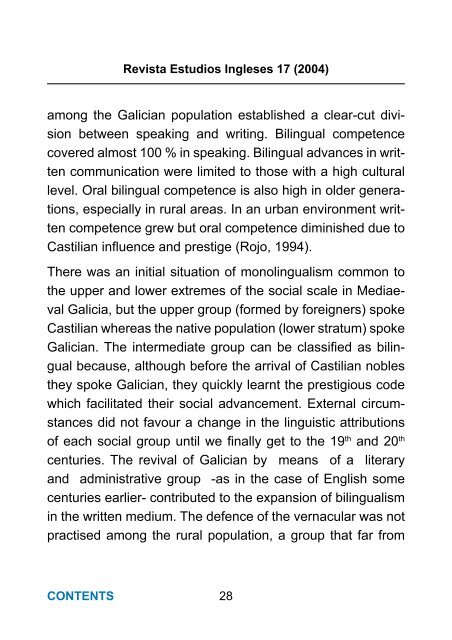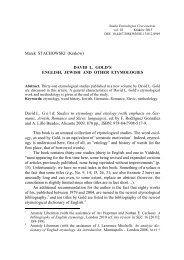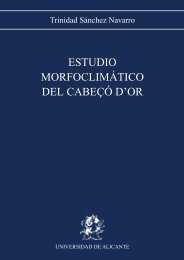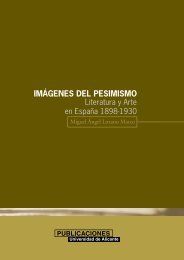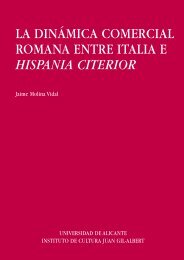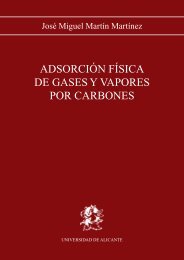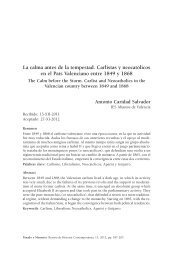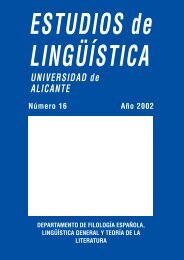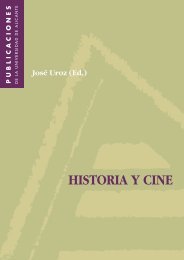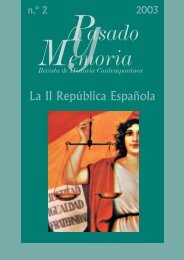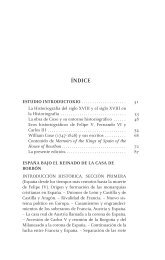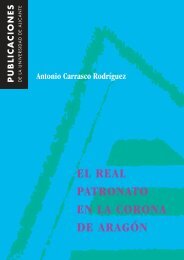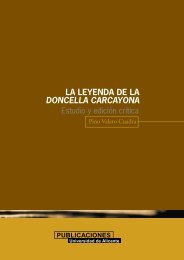English and Galician in the Middle Ages - Publicaciones ...
English and Galician in the Middle Ages - Publicaciones ...
English and Galician in the Middle Ages - Publicaciones ...
You also want an ePaper? Increase the reach of your titles
YUMPU automatically turns print PDFs into web optimized ePapers that Google loves.
Revista Estudios Ingleses 17 (2004)<br />
among <strong>the</strong> <strong>Galician</strong> population established a clear-cut division<br />
between speak<strong>in</strong>g <strong>and</strong> writ<strong>in</strong>g. Bil<strong>in</strong>gual competence<br />
covered almost 100 % <strong>in</strong> speak<strong>in</strong>g. Bil<strong>in</strong>gual advances <strong>in</strong> written<br />
communication were limited to those with a high cultural<br />
level. Oral bil<strong>in</strong>gual competence is also high <strong>in</strong> older generations,<br />
especially <strong>in</strong> rural areas. In an urban environment written<br />
competence grew but oral competence dim<strong>in</strong>ished due to<br />
Castilian <strong>in</strong>fl uence <strong>and</strong> prestige (Rojo, 1994).<br />
There was an <strong>in</strong>itial situation of monol<strong>in</strong>gualism common to<br />
<strong>the</strong> upper <strong>and</strong> lower extremes of <strong>the</strong> social scale <strong>in</strong> Mediaeval<br />
Galicia, but <strong>the</strong> upper group (formed by foreigners) spoke<br />
Castilian whereas <strong>the</strong> native population (lower stratum) spoke<br />
<strong>Galician</strong>. The <strong>in</strong>termediate group can be classifi ed as bil<strong>in</strong>gual<br />
because, although before <strong>the</strong> arrival of Castilian nobles<br />
<strong>the</strong>y spoke <strong>Galician</strong>, <strong>the</strong>y quickly learnt <strong>the</strong> prestigious code<br />
which facilitated <strong>the</strong>ir social advancement. External circumstances<br />
did not favour a change <strong>in</strong> <strong>the</strong> l<strong>in</strong>guistic attributions<br />
of each social group until we fi nally get to <strong>the</strong> 19 th <strong>and</strong> 20 th<br />
centuries. The revival of <strong>Galician</strong> by means of a literary<br />
<strong>and</strong> adm<strong>in</strong>istrative group -as <strong>in</strong> <strong>the</strong> case of <strong>English</strong> some<br />
centuries earlier- contributed to <strong>the</strong> expansion of bil<strong>in</strong>gualism<br />
<strong>in</strong> <strong>the</strong> written medium. The defence of <strong>the</strong> vernacular was not<br />
practised among <strong>the</strong> rural population, a group that far from<br />
CONTENTS<br />
28


